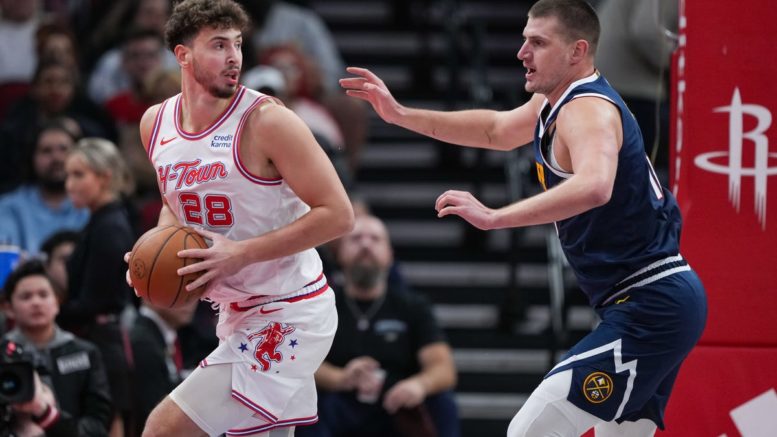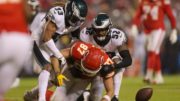Every other generation, a player changes how his position is taught, scouted and played. For the current generation of players entering their prime years, that dude is Nikola Jokić. The “Joker” has taken the passing acumen of former bigs Vlade Divac, Yao Ming, Bill Walton and Arvydas Sabonis and combined it with the physical assertion of Kevin McHale, Patrick Ewing and Tim Duncan to create something worthy of an epoch. But we’re not here to talk about Jokić. We’re here to talk about his acolyte, Alperen Şengün. The Houston Rockets’ third-year center and Turkish sensation is next in line of European players beginning to dominate the NBA landscape.
Şengün has already been dubbed “Baby Jokić” due to the similarities in their offensive games and passing skills. He burst onto the international basketball scene as the MVP of the Turkish League in 2021, putting up stats of 19.2 PPG, 9.4 RPG, 2.5 APG, 1.3 SPG, 1.7 BPG on insane 65/19/81 shooting splits. And the Turkish tower hasn’t been remiss to count Jokić as inspiration for his complete game, as he did recently on Paul George’s podcast, “Podcast P.”
“You know, Jokić is not a social media guy, he cares about basketball and family,” Şengün said. “But he’s a great guy and European. After the game he’s coming up to me saying good job, great job, keep it up. All this great stuff, it’s great for me. I like not trying to play like him, but like you know, our games are similar.”
Like Jokić, Şengün dominates operation out of the high post, finding cutting guards or slipping into the short roll where he leverages high-volume playmaking. In dribble-hand-off situations, Şengün can operate on the perimeter with one hand, using his massive 6-11 frame to create separation from his defender, as well as his teammate on the switch, before handing off a crisp pass to fellow Rockets guards coming off screens. Jokić can do this, too, for far longer than Şengün. But the young stud is doing it quicker in his career than when Jokić came into the league, surpassing the 20 ppg metric a season earlier than Jokić did.
But Şengün thrives in different ways, too. This season, he has improved his long mid-range shots from 32% last season (19 total FGA) to 48% this season (40 total FGA). The double-teams this draws allow for more spacing for Rockets cutters, allowing him to use his elite passing to catch them for easy buckets.
According to Cleaning the Glass, his on/off numbers show his staggering impact on the Rockets’ offense and defense: +4.8 differential, +4.9 points per possession, +3% eFG, -3.9% offensive rebound rate % and -8.2 free throw rate.
Even last year, when the Rockets were still under the misguided hand of Stephen Silas, who guided them to the worst record in the NBA for three straight seasons, Şengün could show magnetic promise. As a sophomore, Şengün was the first 20-year-old center to post an assist rate higher than 20%. He hit 19% his rookie season, finished with 21% his second season and currently holds a 26% assist rate.
It’s fair to say Sengün is a better athlete than Jokić, or at least he appears so on the court, thanks to a lighter frame and more lateral mobility on the block. This translated to Şengün reaching 77 dunks last year while Jokić had 21. Şengün had 70 blocks last year, Jokić had 47. If Şengün stays healthy and in shape, he could surpass Jokić’s potential as a rim runner and shot blocker.
As mentioned, Şengün’s per-36 numbers slightly surpass Jokić’s at the same age. In his second year, Şengün put up 18.4 points, 10.9 rebounds, and 4.8 assists per 36 with a 59.9 true shooting percentage on 21.4 percent usage. Jokić, at 20, produced 16.5 points, 11.6 rebounds, and 3.9 assists per 36 minutes with a 58.2 true shooting percentage on 19.9 percent usage. That’s not to say Şengün will end up as good as Jokić, who already has one championship and looks primed for more. It’s not hyperbole to say Şengün has the tools to be almost as good, which will be enough to make him the best big man in the game once Jokić ages out. There is already a case for Şengün to be the second-best big in the NBA right now, with career-high averages of 21.8 PPG, 8.9 RPG, and 4.6 APG while shooting 54% from the field.
Moving away from the stats and fixating on the eye test, Şengün has that “dawg mentality” that separates stars from superstars. In a recent game against the Bulls on Jan. 11, Şengün was scoreless in the first half. Knowing they would lose if he didn’t turn it on, Şengün went nuclear inside the United Center, erupting for 25 points on a blistering 11-of-19 shooting. He wasn’t just a scoring machine, though, grabbing a nine rebounds and dishing out five dimes to keep the offense humming. This dominant display marks the 10th time in 11 games that Şengün has gone for 20 or more points, including a trio of mind-blowing 30-point performances. It went from the worst performance to the best of his career in just a half.
The Rockets replacing Silas with Ime Udoka, the best motivator in the NBA, has transformed Şengün’s defense. He went from a 116.6 defensive rating last season to 109 this season. That’s .5 better than Jokić this season. Last season, the Rockets were 28th in defensive rating. This year, they’re sixth. That’s the Udoka effect. He demands nothing less than full engagement on that end.
And the young center seems to love Udoka’s tough love coaching style,
“I love tough coaches,” he said. “Sometimes I lose my [concentration]. I feel like when I’m working with coaches [who get] mad I think that makes me wake up. It’s good for me.”
Where Şengün needs to improve is on the perimeter. Jokić has a career average of 35% from three. Şengün is shooting 28% this season. But seeing how much Udoka has improved him on defense, nothing seems impossible for the Turkish star. Only a few players can say their ceiling is entirely up to them. Şengün, like Jokić, belongs to this club.
Original source here
#Alperen #Şengün #chance #Nikola #Jokić





